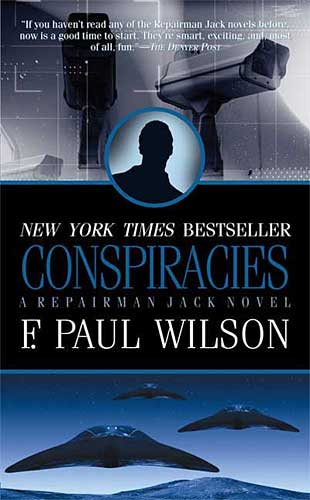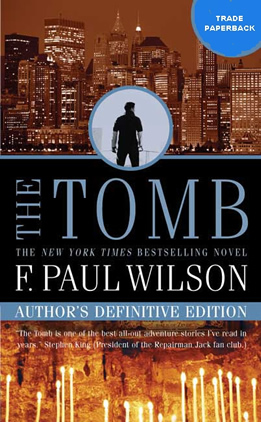Looking back, volume two of the Repairman Jack series (Legacies) was relatively normal. True, there was a hefty chunk of science fiction mixed in with the mystery thriller - a kind of Mickey Spillane meets Isaac Asimov - but after the surprises of volume one it was relatively straightforward, particularly since the chosen bit of science fiction is thought by some to be real. Conspiracy theorists would have you believe that it actually happened, but was hushed up for political reasons. (And that's the only clue you're getting. Read it yourself!) So the theme of book two might just be what inspired volume three - Conspiracies - because that same idea turns up again, alongside UFOs, secret military societies, satanist plots, and a host of other half-baked theories.
This time Jack's called in to track down one of the leaders of a group of conspiracy nuts, who has gone missing before a conference where she is scheduled to reveal her version of the truth behind many odd happenings. The group is called Society for the Exposure of Secret Organizations and Unacknowledged Phenomena, or SESOUP, pronounced 'sea-soup', The name gives F Paul Wilson the opportunity to make lots of jokes along the lines of 'bouillabaisse' and 'fish stew'. One of the recurring characters in the series is Abe, Jack's gun supplier, who hides his true trade behind the counter of a sports shop. Abe is the 'voice of reason' who Jack consults whenever his customers become troublesome, or he needs a new weapon. It is Abe, who also doubles as the comedy relief, who is familiar with more versions of sea soup than anyone has a right to be.
Once again it's difficult to tell you much about the book without giving away too much of the plot, but suffice to say the cast of weird characters in Conspiracies is even more creative than in volume one, and almost nobody is what they first appear to be. There are plenty of opportunities for Jack to demonstrate his skills as a righter-of-wrongs, not least in the side story of a domestic violence case. Wilson weaves so many threads and cross-plots into this tale that I admit I'm still not exactly sure who murdered one of the bodies. In fact, given that Jack was the only person who saw the corpse, she might not actually be dead, and could well turn up again in volume four. That's the level of weirdness I'm starting to expect from this series.
This time Jack's called in to track down one of the leaders of a group of conspiracy nuts, who has gone missing before a conference where she is scheduled to reveal her version of the truth behind many odd happenings. The group is called Society for the Exposure of Secret Organizations and Unacknowledged Phenomena, or SESOUP, pronounced 'sea-soup', The name gives F Paul Wilson the opportunity to make lots of jokes along the lines of 'bouillabaisse' and 'fish stew'. One of the recurring characters in the series is Abe, Jack's gun supplier, who hides his true trade behind the counter of a sports shop. Abe is the 'voice of reason' who Jack consults whenever his customers become troublesome, or he needs a new weapon. It is Abe, who also doubles as the comedy relief, who is familiar with more versions of sea soup than anyone has a right to be.
Once again it's difficult to tell you much about the book without giving away too much of the plot, but suffice to say the cast of weird characters in Conspiracies is even more creative than in volume one, and almost nobody is what they first appear to be. There are plenty of opportunities for Jack to demonstrate his skills as a righter-of-wrongs, not least in the side story of a domestic violence case. Wilson weaves so many threads and cross-plots into this tale that I admit I'm still not exactly sure who murdered one of the bodies. In fact, given that Jack was the only person who saw the corpse, she might not actually be dead, and could well turn up again in volume four. That's the level of weirdness I'm starting to expect from this series.



